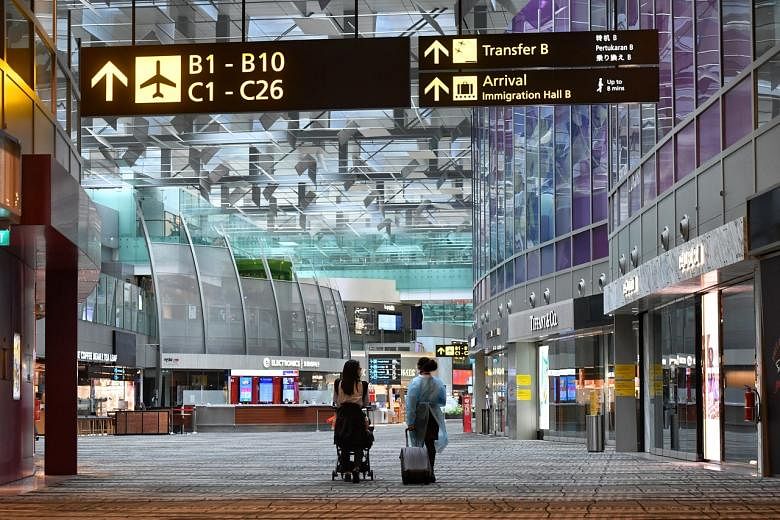SINGAPORE - Changi Airport sunk into the red for the first time in the financial year ended March 31, with only 1.1 million passengers passing through its gates as the Covid-19 pandemic wreaks havoc on air travel.
It represented a 98 per cent drop in passenger traffic from the previous year.
The net loss attributable to shareholder was $954 million, down from the $435 million profit in financial year 2019/20.
The number of planes passing through the airport fell by 80 per cent in the same period, and concession sales plunged by almost 90 per cent.
The figures were reported in Changi Airport Group's (CAG) latest annual report released on Monday (Aug 30).
CAG chairman Tan Gee Paw and chief executive Lee Seow Hiang said in a joint message that FY2020/2021 has been the most difficult year in Changi Airport's history.
They said that hopes of travel recovery have been dampened by ongoing closure of borders, and that CAG has been especially hard hit due to the absence of a domestic air travel market in Singapore.
The group said the $954 million net loss registered was driven by the weaker performance due to the pandemic as well as non-cash impairment, depreciation and amortisation charges.
It added that revenue from airport services, airport concessions and rental income all fell significantly, resulting in its overall revenue declining by 78 per cent to $697 million.
But cargo demand has remained strong as countries sought to restore supply chains, CAG said.
In the past financial year, air cargo going through Changi fell 23 per cent compared with the previous year, a less significant drop compared with other metrics such as passenger numbers.
By March this year, cargo throughput in Changi had almost rebounded to the levels before the pandemic.
CAG noted that it took several stringent cost-cutting measures to mitigate the impact of the Covid-19 pandemic.
For example, it had suspended operations in Terminal 2 and Terminal 4 since May last year, and renegotiated service contracts in line with lower passenger traffic.
"These measures, coupled with a companywide salary reduction and hiring freeze, and support from the Government, enabled Changi Airport to reduce its operating expenses by about 56 per cent," said CAG.
On the retail front, CAG said that it recorded $280 million in concession sales in FY20/21.
While this was about 11 per cent of the volumes recorded the year before, it was still a less drastic drop than the drop in passenger traffic.
It credited several initiatives for helping to buffer the impact of the fall in traffic, such as its push towards e-commerce targeting local residents as well as the introduction of shopping tours in the transit area.
CAG added that the airport and its staff have been busy with several initiatives in the past year despite the fall in traffic.
For example, it converted T4 into Singapore's largest vaccination centre.
The centre has facilitated vaccination for the aviation and maritime sectors, as well as government bodies and front-line agencies. It can be scaled up to vaccinate 4,000 people a day.
CAG has also ramped up its Covid-19 testing capabilities such that it was able to handle tests for 20,000 passengers daily at T1 and T3 as at March this year.
Mr Tan and Mr Lee said the airport is confident that it will be able to bounce back despite the chastening year.
"As countries across the globe step up on vaccinations, and with emerging testing technologies promising to be more affordable and delivering faster results, there is good reason to believe that travel will resume in a matter of time."


